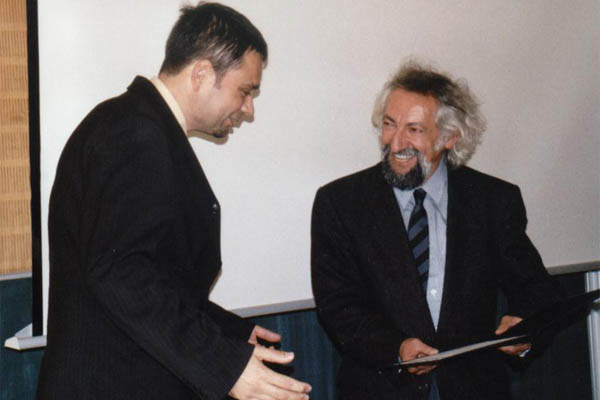Herbert Stiller Award 1995-2001
Research prize of Doctors Against Animal Experiments Germany (Herbert-Stiller-Award)
The research prize was initiated to support research about cause and treatment of human diseases without animal experiments.Doctors Against Animal Experiments Germany reject animal testing on ethical, methodological and medical grounds. In order to support medical research without any animal experiments, especially among younger physicians and scientists, we have in the past awarded a research prize of 12,500 Euro and a doctorate prize of 5,000 Euro every other year.The prizes are named after Dr Herbert Stiller (1923-1984), medical doctor, specialist in neurology, psychiatry and psychotherapy and co-founder of our organization.
They were awarded for scientific work dealing with relevant causes and treatment of human diseases and providing an important contribution for medical progress without the use of animal experiments. This may be in vitro or clinical and epidemiological studies about causes of today's major illnesses.At the moment the Herbert-Stiller-Award is not being awarded.
Prize winners
2001: Dr. Barbara Grune Dr. Jan Zak
On the 8th of September 2001, the Association »Doctors Against Animal Experiments« awarded their Herbert-Stiller-Award of 12,500 Euro to Dr. Barbara Grune from the ZEBET (Zentralstelle zur Erfassung und Bewertung von Ersatz- und Ergänzungsmethoden zum Tierversuch, Central Agency for Evaluation and Assessment of Methods for Replacement and Supplementation of the Animal Experiment) of the Federal Institute of Consumer Protection and Veterinary Medicine. This prize for medical research without animal experiments is supported financially by the Association »Citizens Against Animal Experiments« from Hamburg.Dr. Grune received the prize for the inauguration of a database about scientific methods without animal experiments. Using the database, scientists can obtain detailed information about in vitro methods when planning their studies.In addition, Dr. Jan Zak from the university hospital of Münster, was awarded the doctorate prize of 5,000 Euro. During the work on his doctor thesis, he developed a method for cancer research without animal experiments. In order to obtain information about the spreading of metastases, cancer cells were up to now injected into mice. With the new method, the potential of metastasis can be studied in vitro.

Dr Bernhard Rambeck (right), member of the board of Doctors Against Animal Experiments awarding Dr Jan Zak (left).
1999: Dr. Thomas K. Nordt
On the 8th of May 1999, the Association »Doctors Against Animal Experiments« awarded their Herbert-Stiller-Award of 12,500 Euro to Dr. Thomas K. Nordt, Hospital of the Ruprecht-Karls-University in Heidelberg. This prize for medical research without animal experiments is supported financially by the Association »Citizens Against Animal Experiments« from Hamburg.The prizewinner and his colleagues conducted studies about the high susceptibility of diabetics for heart and vessel diseases. Dr. Nordt could demonstrate that and in which way the drug Gemfibrozil, normally used to lower high lipid levels in the blood, leads to physiological changes of the blood lipids and could lower the susceptibility of diabetics for atherosclerotic diseases (heart attack, stroke, circulatory disorders of the legs etc.).Of special interest is the fact, that those studies were conducted in vitro (in the test tube) with human liver cells without animal experiments. The Association »Doctors Against Animal Experiments« claims it a big success into the direction of the abolition of animal experiments, that scientists of the Ruprecht-Karls-University in Heidelberg worked with cell systems without animal experiments, as this university normally is a stronghold of research based on animal experiments.
1997: Dr. med. Dr. rer. nat. Gunther O. Hofmann
On the 28th of June 1997, the Association »Doctors Against Animal Experiments« awarded their Herbert-Stiller-Award of 12,500 Euro to outside lecturer Dr. med. Dr. rer. nat. Gunther O. Hofmann from the Berufsgenossenschaftliche Unfallklinik in Murnau. This prize for medical research without animal experiments is financially supported by the Association »Citizens Against Animal Experiments« from Hamburg.The prizewinner studied medicine and physics and is specialist for accident injuries. For the first time, he transplanted the knee joint of a deceased to a young man, who had a severe accident with his motorbike. Dr. Hofmann and his colleagues did not conduct any animal experiments during preparing this and further operations (»Allogenic vessel-pediculated transplantation of the femur and allogenic vasculated transplantation of a human knee joint«).
Following Dr. Hofmann, he attached greatest importance to preparing the complete studies about organ rejection in vitro (in the test tube) and with cell cultures of human bone marrow cells and to conducting anatomical/pathological studies in the institute of pathology with corpses.
1995: Dr. Stefan Rosewicz, Dr. Peter Wingenfeld and Dr. Martina Linde-Behringer
On the 23rd of September 1995, the Association »Doctors Against Animal Experiments« awarded their Herbert-Stiller-Award of 12,500 Euro in equal parts to Dr. Stefan Rosewicz, Free University of Berlin, and Dr. Peter Wingenfeld, University of Cologne. Those prizes for medical research without animal experiments are financially supported by the Association »Citizens Against Animal Experiments« from Hamburg.Outside lecturer Dr. Rosewicz from the Free University of Berlin studied possibilities of blocking the growth of cancer cells of the pancreas in culture in order to develop treatment for pancreatic cancer. Following the prizewinner, the encouraging results about the treatment of this extremely malignant cancer could exclusively be obtained with cells in culture – neither with animal experiments nor with examination of cells from killed animals.The second prizewinner, Dr. Wingenfeld from the University of Cologne, studied the conservation of human organs for transplantation, together with the director of the pediatric department of the University of Cologne, Prof. Dr. Dietrich Michalk. With the help of cultured kidney cells, the influence of stabilizing supplements was studied in vitro. The scientists' aim was the improvement of transplantation of human organs and their conservation after removal from the body.In addition, a doctorate prize of 5,000 was awarded to Dr. Martina Linde-Behringer from the University of Erlangen-Nürnberg. Dr. Linde-Behringer examined cells of the human eye, obtained from organ-donors, while working on her doctor thesis. She mimicked certain diseases of the eye in culture and verified therapeutic options. No animal experiments were conducted during this study.
